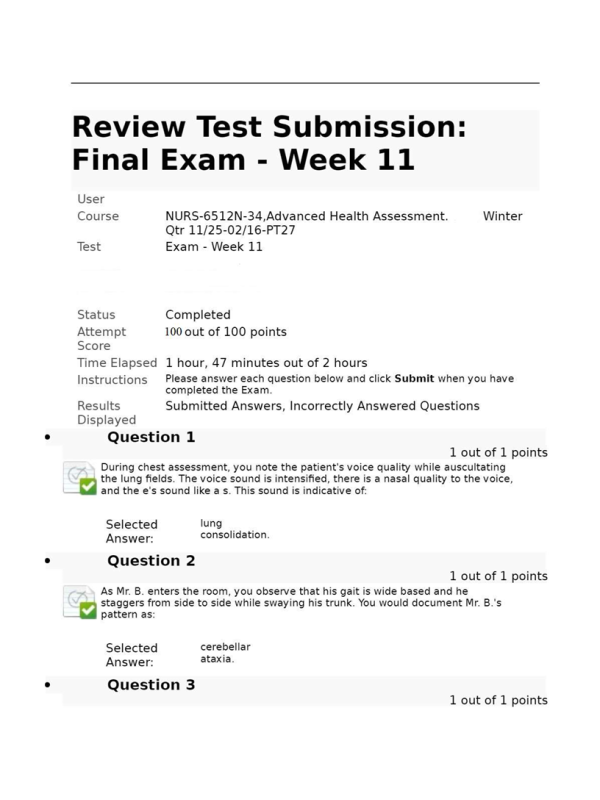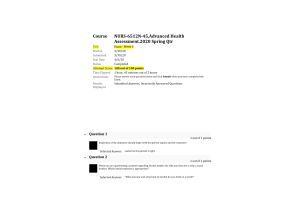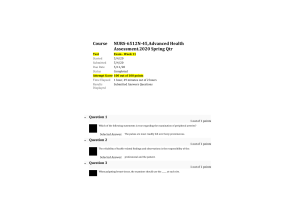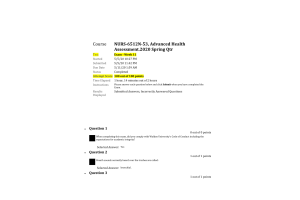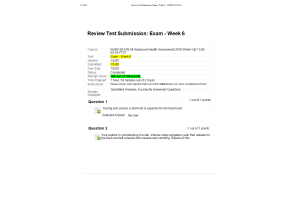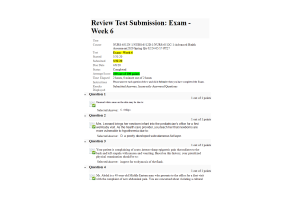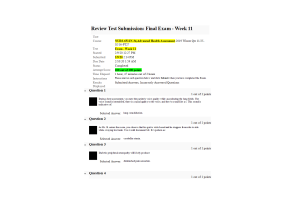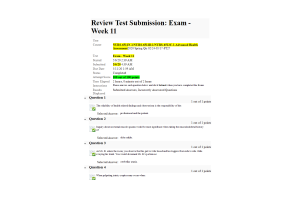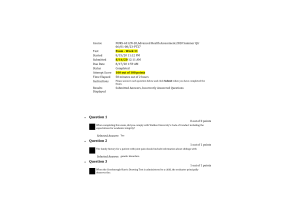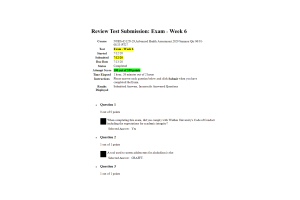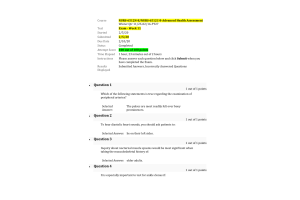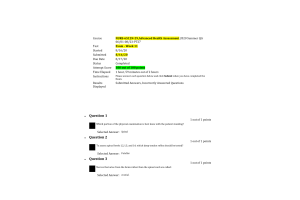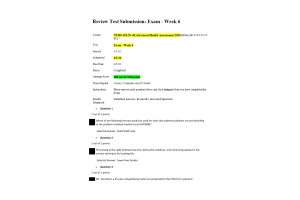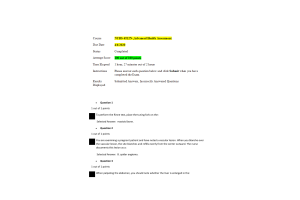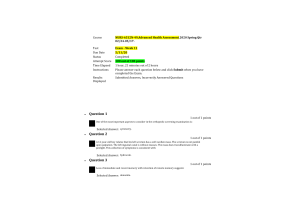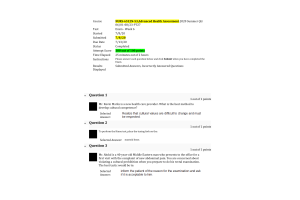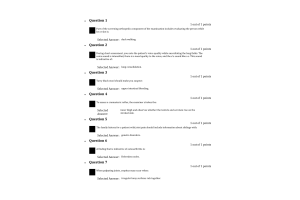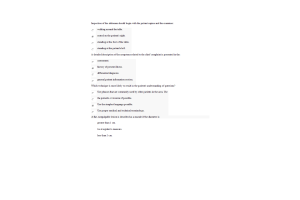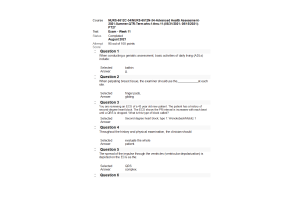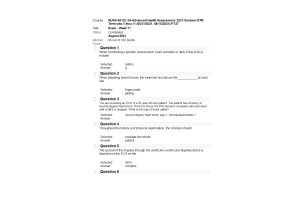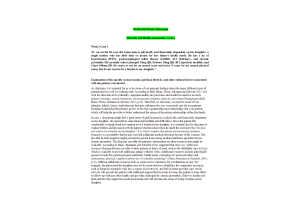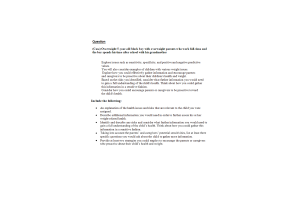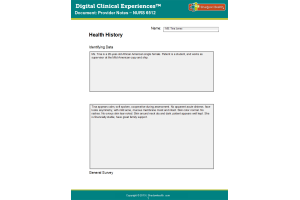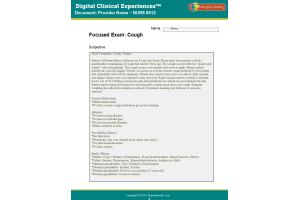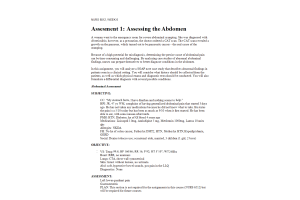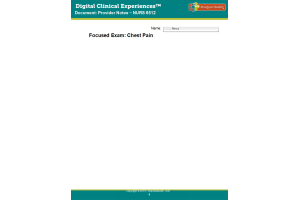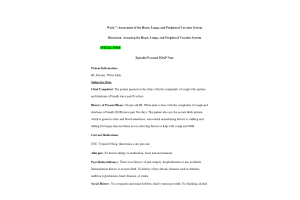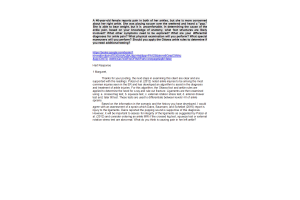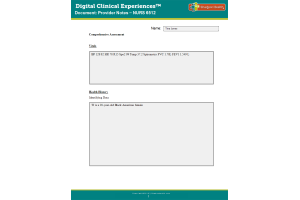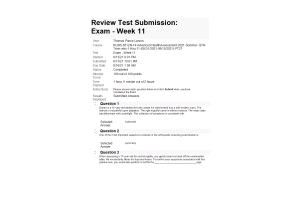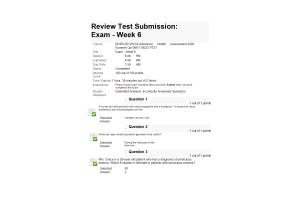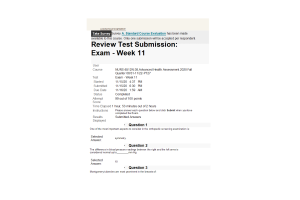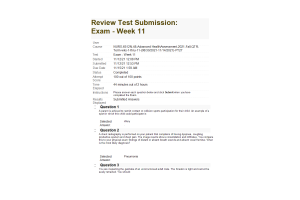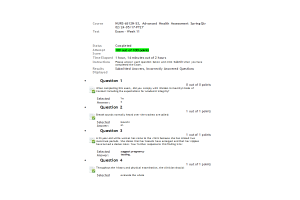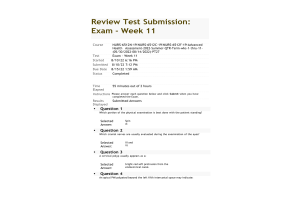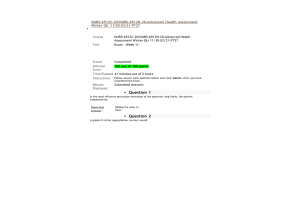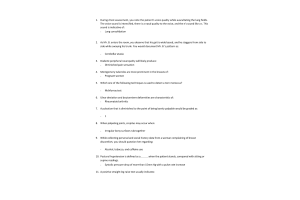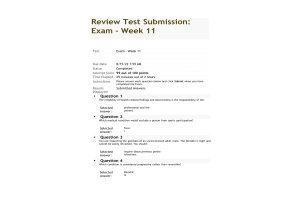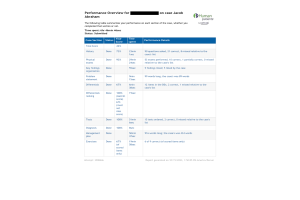NURS 6512N-34 Week 11 Final Exam (100 out of 100 Score)
- $55.00
- Question: During the assessment, you note the patient’s voice quality while auscultating the lung fields. The voice sound is intensified, there is a nasal quality to the voice, and the e’s sound like a s. this sound is indicative of:
- Question: As Mr. B. enters the room, you observe that his gait is wide based and he staggers from side to side while swaying his trunk. You would document Mr. B. ‘s pattern as:
- Question: Diabetic peripheral neuropathy will likely produce:
- Question: Montgomery tubercles are most prominent in the breast of
- Question: Which one of the following techniques is used to detect a torn minuscus
- Question: Ulnar Deviation and boutonniere deformities are characteristics of
- Question: A pulsation that is diminished to the point of being barely palpable would be grabbed as
- Question: In the most effective percussion technique of the posterior lung fields the patient cooperates by
- Question: When palpating joints, crepitus may occur when
- Question: While collecting personal and social history data from a woman complaining of breast disk comfort you should question her regarding
- Question: Postural hypotension is defined as a when the patient stands compared with sitting or supine readings
- Question: You are examining in the emergency department who has recently sustained head trauma in order to initially assess this patients’ neurologic status you would
- Question: Temporalis and masseter muscles are evaluated by
- Question: A parent is advised to restrict contact or collision sports participation for their child and example of a sport in which this child could participate is
- Question: Carnival nerve XII may be assessed in an infant by
- Question: The reliability of health related finding and observations in the responsibility of the
- Question: Normal changes of the aging brain include
- Question: The adnexa of the uterus are composed of the
- Question: For purposes of examination and communication of physical findings the breast is divided into
- Question: A patient in the deepest coma would be scored a ____on the glasgow coma scale
- Question: A patient you are seeing in the emergency department for chest pain is suspected of having a myocardial infection during the health history interview of his family history he relates that his father had died of heart trouble the most important follow up question you should pose in which of the following
- Question: Nerves that arise from the brain rather than the spinal cord are called
- Question: While examination 30-year-old woman you not that one breast is slightly larger than the other in response to this finding you should
- Question: In the adult the apical impulse should be most visible when the patient is in what position
- Question: 23-year-old white woman has come to the clinic because she has missed to menstrual periods she states that her breast have enlarged and that her nipples have turned a darker color your further response to this finding is to
- Question: Terry black stool should make you suspect
- Question: To access spinal levels l2 l3 and l4 which deep tendon reflex should be tested
- Question: You are conducting an examination of Mr kurtis heart and blood vessels and auscultate a grade 3 marmar the intensity of this murmur is
- Question: To access cremasteric reflex the examiners strokes the
- Question: An examiner has rotated a brush several times into the cervical OS the brush was withdrawn and stroke lightly on a glass slide the slide was spread with fixative which type of specimen requires this technique for collection
- Question: Functional assessment is most important during the examination of a
- Question: Part of the screening orthopedic component of the examination includes valuating the person while he or she is
- Question: To spread the breast tissue evenly over the chest wall you should ask the woman to lie supine with
- Question: When is the mental status portion of the neurologist system examination performed
- Question: If a patient cannot shrug the shoulders against resistance which cranial nerve required for the evaluation
- Question: One of the most important aspects to consider in the orthopedic screening examination is
- Question: You are examination Mr S, a 79-year-old diabetic man complaining of claudication which of the following physical findings is consistent with the diagnosis of arterial occlusion
- Question: The mini mental status examination should be administrated for the patient who
- Question: If pitting edema is unilateral you would suspect occlusion of a
- Question: The best way to is the apprehension of a 3-year-old child before a physical examination is to
- Question: Nancy Walker is a 16-year-old girl who presents to the clinic with complaints of severe acute chest pain her mother reports that Nancy apart from occasional colds nancy is not prone to respiratory problems what potential risk factor is most important to assess with regards to nancy's current problem
- Question: Your patients’ chief complaint is repeated pencil likes stools further examination should include
- Question: To hear diastolic heart sounds you should ask patient to
- Question: The spread of the impulse through the ventricles is depicted on the ECG as the
- Question: Kawasaki disease is suspected when assessments of a child reveal
- Question: Which one of the following is a proper technique for use of a speculum during a vaginal examination
- Question: You are interviewing at 20-year-old patient with a new on set psychotic disorder the patient is the apathetic and has disturbed thoughts and language patterns the nurse recognizes this behavior pattern as consistent with a diagnosis of
- Question: Inspection of a scrotum should reveal
- Question: The finger to nose test allows assessment of
- Question: By manual examination of a uterus includes
- Question: You are inspecting the genitalia of an uncircumcised adult male the foreskin is tired and cannot be easily retracted you should
- Question: The difference in blood pressure readings between the right and the left arms is considered normal up to___ mm Hg
- Question: When you attempt to move a 10-month old child from his mother's lab to the examination table hescrames loudly your best action is to
- Question: It is especially important to test for ankle colonus if
- Question: A finding that is indicator of osteoarthritis is
- Question: The check out station for pre participation physical evaluation (PPE) is critical because at this point
- Question: When pal painting brush tissue the examiner should use the ___at each site
- Question: Which portion of the physical examination is best done with the patients standing
- Question: Throughout the history and physical examination the clinician should
- Question: You are initially evaluating the equilibrium of miscue you ask her to stand with her feet together and arms at her sides she loses her balance miss Q has a positive
- Question: Anterior cruciate legiment integrity is assessed via the___ test
- Question: Breath odors May Clue the examiner to certain underling metabolic condition the odors of ammonia on the breath may signify
- Question: The Mini Mental State examination
- Question: A common finding is markedly obese and pregnant women is
- Question: The Denver 2 is a tool used to determine
- Question: The strength of the trapezius muscle is evaluated by having the patient
- Question: A red, hot swollen joint in a 40-year-old man should lead you to suspect
- Question: Examination of the patient in the lithotomy, or Nee chest, position includes
- Question: Assessing orientation to person, place, and time helps determine
- Question: When the good enough Harris drawing test is administrated to a child, the evaluator principly observed the
- Question: At 12-year-old boy relates that his left scrotum has a soft swelling mass. the scrotum is not painful upon palpation. the left inguinal Canal is without masses. the mass does trans illuminate with a pen light. this collection of symptoms is consistent with
- Question: The rectal past medical history of all patients should include enquiry about
- Question: The goals of Pre participation sports evaluation include
- Question: An idiopathic spasm of arterioles in the digits is termed
- Question: A cervical polyp usually appears as a
- Question: Your older clinic patient is being seen today as a follow up for our two-day history of pneumonia. The patient continues to have a productive cough, shortness of breath and lethargy and has been spending most of the day lying in bed. you should begin the chest examination by
- Question: Which condition is considered progressive rather than reversible
- Question: Recent unilateral inversion of a previously averted nipples suggests
- Question: Electrical activity recorded by the electrocardio diagram ECG tracing that denotes the spread of the stimulus through the Atria is the
- Question: An apical PMI Palpated beyond the left 5th intercostal Space may indicate
- Question: The examiner percusses for diaphragmatic excursion along the
- Question: Which of the following statements is true regarding the examination of peripheral arteries
- Question: You are conducting a clinical breast examination for your 30-year-old patient her breasts are symmetrical with bilateral, multiple tender masses that are freely movable with well defined borders. You recognize that these symptoms and assessment findings are consistent with
- Question: The presence of cervical motion tendinous may indicate
- Question: When assessment superficial pain, touch, vibration and position perception you are testing
- Question: The family history of a patient with joint pain should include information about siblings with
- Question: Which cranial nerves are usually valuated during the examination of the eyes
- Question: While interviewing a 70-year-old female clinic patient she tells you that she takes ginkgo biloba and Saint John's wort. You make a short note to check for results of the
- Question: When conducting a geriatric assessment, basic activities of daily living ADL include
- Question: Palpation of a normal prostate in an older adult is likely to feel
- Question: Breath sounds normally heard over a trachea are called
- Question: When assessing a 17-year-old for nuchal rigidity, you gently raise his head of the examination table. he involuntary flexes his hips and knees. to confirm your suspicions associated with this positive test you would also perform a test for the____ sign
- Question: During a routine parental visit Ms T was noted as having dependent edema, very courses of the legs and hemorrhoids. She expressed concern about the symptoms. you explained to ms T that her enlarge uterus is compressing her pelvic veins and her interior Vena cava. you would further explain that these findings
- Question: Facial muscle or tongue weakness may result in
- Question: A positive straight leg rays test usually indicates
- Question: At your first meeting with a patient, it is usually best to say
- Question: The foramen ovale should close
- Question: If your patient has a nipple discharge, you will most likely need
- Question: A grad IV mital regurgitation marmar would
- Question: Palpation of epitrochlear nodes is part of the
